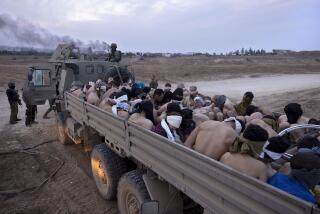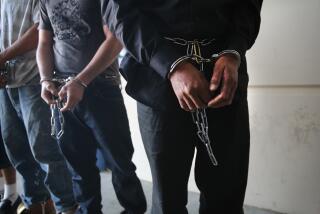Red Cross Says Iraq Blocking Efforts on POWs : Prisoners: The neutral organization is supposed to help protect captives. But it complains that it is being stonewalled.
GENEVA — Months before fighting exploded in the Persian Gulf and the first American and allied aviators parachuted into Iraqi-held territory, the International Committee of the Red Cross here had launched a campaign to protect the prisoners of war who inevitably were to come.
Thousands of leaflets, printed in more than a dozen languages spoken among the 29 countries involved in the war, were distributed on both sides of the Kuwait-Saudi Arabia border. The tracts, simple enough for a common foot soldier to understand, outline the rights of POWs contained in the 1949 Geneva Conventions on the Treatment of Prisoners of War.
They include the right to humane treatment, medical care, food and shelter and freedom from political manipulation or subjection to “public curiosity”--a provision intended to prevent recurrence of the incidents of parading captured soldiers through the streets that occurred during World War II.
Following the Iraqi invasion of Kuwait, Red Cross officials visited leaders of Iraq and the opposing international coalition countries to remind them of the Geneva mandates. Direct and indirect diplomatic channels were opened in dozens of countries, including pro-Iraq Jordan and Yemen, as well as in Algeria, known for its leading role in Arab diplomacy.
But International Committee of the Red Cross (ICRC) officials interviewed last week at the organization’s headquarters near the U.N. complex said they have been stonewalled by the Iraqi side since the outbreak of war.
Repeated attempts over 10 days by four Red Cross delegates in Baghdad to make contact with coalition POWs through the Iraqi government met with failure, never getting beyond a low-level functionary at the Iraqi Ministry of Foreign Affairs, the officials reported.
Behind-the-scenes diplomatic efforts, including an appeal to Jordan’s King Hussein for help, also hit dead-ends.
“We have not received official notification from Baghdad that they have prisoners of war,” said Angelo Gnadinger, ICRC chief Middle East delegate. “Negotiations are under way, but we are still waiting for communication.”
The Red Cross complex in Pregny, just outside Geneva, is built on the grounds of the former Carlton Hotel. For more than 125 years, the International Committee of the Red Cross has been the lifeline to captured combatants around the world.
Only a few days after Saddam Hussein’s military forces invaded Kuwait last August, the ICRC set up a special Gulf Task Force under Peter Fuchs, a lanky, chain-smoking senior Red Cross official with field experience in Iran, Central America, Asia and Africa.
His experience in the eight-year war between Iran and Iraq made him an ideal choice for the job of directing the 141 ICRC delegates in the war region, including those in Saudi Arabia, Iran and Turkey.
However, in an interview conducted in the frenetic task force command center, a series of high-tech offices grouped around a central communication room similar to a military situation room, Fuchs said the scale of the current war exceeds anything in the bloody Iran-Iraq conflict.
“This is a completely new experience,” he said. “Iran-Iraq was big, but not at all of the same magnitude in terms of the number of countries involved and the impossibility of predicting what will happen next.”
He said ICRC efforts have been severely hampered by allied bombing of Iraqi telephone communication centers. The Red Cross has not had direct contact with its representatives in Baghdad since the second day of fighting. Messages have to be hand-carried by delegates who drive across the battle zone 150 miles to the Iranian border. As a result, Fuchs admitted, information about the situation inside Iraq is at least two days old by the time it reaches Geneva.
Fuchs said the communications breakdown also impedes Red Cross efforts to get the names of Iraqi prisoners to the Iraqi Ministry of Defense in Baghdad.
In Geneva, Fuchs supervises a staff of 500 Swiss delegates who concentrate on the Gulf War. Since war began, the ICRC headquarters has been staffed 24 hours a day and Fuchs holds daily task force meetings. But because of the relative few number of casualties in Saudi Arabia and the inability of Red Cross delegates to travel inside Iraq, the task force is like a giant engine that has no fuel.
His Geneva staff includes teams of computer operators who compare lists of prisoner names from a variety of sources--including Iraqi television--with rosters of military forces in the area, provided by the allied defense departments. A special unit of the ICRC Central Tracing Agency takes information provided by capturing powers and uses it to contact the prisoner’s family, usually through a government intermediary. In the United States, the intermediary is the Department of Defense.
Although the coalition forces have attempted to cooperate with the Red Cross, the relative inexperience of American soldiers has initially caused some problems. “In an Arab culture,” said Sophie Martin, deputy director of the Central Tracing Agency, “a name is composed of the person’s first name, the first name of his father and the first name of his grandfather. If any one of these is out of place, the identity is completely changed.”
She said cards filled out by American soldiers on prisoners have sometimes come back with parts of the names reversed, making identification difficult.
Like the rest of the world, Red Cross workers watched impotently as U.S. and coalition pilots were paraded before television cameras.
International lawyers contend that Iraq’s televising of captured pilots is the modern equivalent of marching captured soldiers through the streets, outlawed by the Third Geneva Convention.
Red Cross officials listened helplessly, too, as Iraqi radio announced last week that a captured pilot had been killed in a U.S. bombing raid on the Iraqi Ministry of Industry, where the Iraqis said he had been placed as a “human shield.” The Geneva Conventions provide that POWs be kept away from battlefields or strategic sites.
In the latest blow to Red Cross efforts, Iraqi officials announced last week that they plan to treat POWs as criminals, a blatant violation of the Geneva accords.
Despite the Iraqi violations, Red Cross officials said there are some encouraging signs. For one thing, Iraqi officials last week permitted a convoy of Red Cross trucks containing medical supplies and four Red Cross delegates to travel from Iran to Baghdad. The group now has eight delegates in Baghdad.
During the Iran-Iraq War, the Red Cross publicly criticized Iraq for its treatment of Iranian prisoners of war. On May 11, 1983, the organization accused Iraq of “concealing” a number of prisoners in places to which Red Cross delegates were denied access.
Fuchs said 300 Iraqi POWs had been interviewed by Red Cross delegates in Saudi Arabia and that he was “satisfied” with the coalition’s compliance with the Geneva Conventions.
The Red Cross has come under increasing fire from U.S. and British officials for not condemning Iraq’s failure to comply with the Geneva accords, including Iraq’s rejection of interviews of captives by Red Cross delegates.
Publicly, officials with the Swiss organization say their silence is part of the “neutrality” of the organization in armed conflicts. They contend that American and British officials do not understand how this neutrality enables the Red Cross to work effectively.
Red Cross officials said they have been afraid to condemn Iraqi actions out of fear that would cement the Iraqis’ resolve to deny access to allied prisoners.
“We want to visit these POWs,” said Jean-Philippe Levoyer, ICRC legal representative. “If we start denouncing the Iraqis, we might never see them.”
More to Read
Sign up for Essential California
The most important California stories and recommendations in your inbox every morning.
You may occasionally receive promotional content from the Los Angeles Times.










